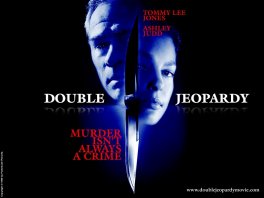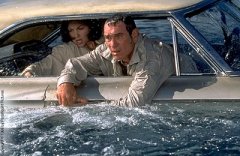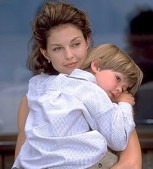 Starring
Ashley Judd, Tommy Lee Jones, Bruce Greenwood, Annabeth Gish, Roma Maffia.
Starring
Ashley Judd, Tommy Lee Jones, Bruce Greenwood, Annabeth Gish, Roma Maffia.Written by David Weisberg & Douglas Cook.
Directed by Bruce Beresford.
 Starring
Ashley Judd, Tommy Lee Jones, Bruce Greenwood, Annabeth Gish, Roma Maffia.
Starring
Ashley Judd, Tommy Lee Jones, Bruce Greenwood, Annabeth Gish, Roma Maffia.
Written by David Weisberg & Douglas Cook.
Directed by Bruce Beresford.
Grade: C+
Review by Kristian Wiggert.
Someday, Ashley Judd will star in the film that will win her an Academy Award® for Best Actress. Until then, we will have to enjoy her talents in films like Double Jeopardy, a diverting revenge fantasy that Judd, with the ever-reliable Tommy Lee Jones, elevates a couple of notches above the ordinary.
Judd plays Libby Parsons, wife of Seattle-area mogul Nick Parsons (Bruce Greenwood). Libby and Nick have a cute four-year-old son, Matty. Everything seems perfect for the trio as Nick hosts a private-school benefit at his waterfront compound. The smug, cultured (he likes early Kandinsky) Nick keeps his well-heeled guests chuckling with witty banter, while Libby plays the hostess.
Because there has to be a plot, this upper-class domestic bliss cannot last.
Nick has desires that exceed his means. Creditors are calling in the midst of
his lavish party, threatening all sorts of nasty consequences, none of which
information Nick shares with his beloved wife. Things become even more ominous
when Nick presents Libby with a sailboat--which she knows they cannot afford--for
her birthday. He then suggests that they take it out for the weekend, which
surprises Libby because Nick hates sailing.
So begins Libby's journey into hell. While out to sea, Libby awakens to find blood all over the boat, but no Nick. Nick is presumed dead, and not long afterward, Libby is charged with his murder. After a half-hearted defense, led by Nick's former attorney (who in the real world would be charged with malpractice, because he's a business lawyer), she is convicted and sent to prison. She gives up custody of her son to her best friend Angela Green (Annabeth Gish). Not long after her incarceration, she learns that she was framed so that Nick could collect the insurance money. She then spends the next six years in physical training (adding to the kick-boxing lessons she took in Kiss the Girls) for revenge against her conniving husband. Her support group--this is not Chained Heat, after all--consists of two women who actually did kill their husbands. But the husbands probably deserved it, because the women seem nice enough. One of them, a former lawyer, helpfully tells Libby that because she has already been convicted of killing Nick, if she finds him now she can kill him with impunity because of the Fifth Amendment's prohibition against double jeopardy (hence the title).
Armed with this dubious legal advice (killing Nick would probably be a parole violation and would almost certainly violate his civil rights), Libby obtains parole and ends up in a halfway house run by parole officer Travis Lehman, an ex-law professor played by Tommy Lee Jones. She soon breaks parole and sets out to find her husband and get her son back. Jones, looking more like a bloodhound than ever, pursues Libby for the rest of the film in a reprise of his role from The Fugitive.
There have been dozens of films like Double Jeopardy. We know that eventually
Judd will find Greenwood, have her revenge somehow and get her son back. So,
what makes Double Jeopardy worth watching? Moreover, why is it making
more money than a fairly predictable thriller has any business making? In a
word, Judd. She plays her two-dimensional part with such emotional range that
it is still possible to believe (for 90 minutes, at least), that something new
is going on. Judd's beauty is undeniable, but it's not all glamour. She is an
emotional wreck (and who wouldn't be) after she learns of her betrayal. She
can also be tough, as she was in Kiss the Girls, tenaciously and resourcefully
going across the country to find Greenwood. Or she can be the epitome of motherhood.
Director Bruce Beresford did not have to go to great lengths to infuse her scenes
with Matty with a luminosity that one would expect from a Renaissance Madonna
and Child. She dominates the film. In short, she displays the on-screen magnetism
of a true star.
Beresford also does a decent job with the material at hand. He gives us the obligatory shots of the Pacific Northwest landscape and, later in the film, a claustrophobic scene inside of a coffin that recalls The Vanishing, except that we know it can't end as badly as the original European version of that film, because this is America.
But it is Judd's performance, and the able assistance of Jones, that makes this film appealing to a broad spectrum of viewers. In particular, where a typical revenge thriller is pretty much a one-way ride to a predictable, violent end, Double Jeopardy overlays a tough-minded mother's search for her child, while keeping the predictable, violent end. Which means that some women might actually be interested in watching the film. So, while most critics have panned Double Jeopardy, the producers are looking at 100 million plus in domestic box office alone. Hopefully, its financial success will enable Judd to take on more substantive roles in the future and become a true star.
You won't be too upset if you miss Double Jeopardy on the big screen and see it on video, but you won't feel you've wasted the price of a ticket, either.
Review © October 1999 by AboutFilm.Com
and the author.
Images © 1999 by Paramount Pictures. All Rights Reserved.
Send us a comment on this review. We'll post a link to the best comments!